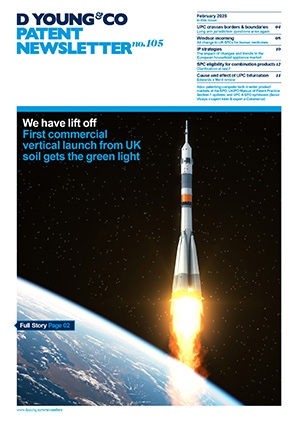Windsor incoming: all change to UK SPCs for human medicines
The provisions of the Windsor Framework regarding Northern Ireland, agreed in 2023 between the UK and EU, entered into force on 01 January 2025. Although the Windsor Framework does not contain any direct provisions regarding IP rights, its effect on pharmaceutical regulation will change the way the UK handles supplementary protection certificates (SPCs) for human medicines in the future. SPCs extend the term of patents for medicines (both human and veterinary) and plant protection products (pesticides) which require the grant of a marketing authorisation (MA) before they can be marketed.
Background: Northern Ireland Protocol and split marketing authorisations in UK
Under the Northern Ireland Protocol, which was part of the UK’s original withdrawal agreement, EU law on goods, including human and veterinary medicines, continued to apply to Northern Ireland following Brexit. The effect of this was that regulation of medicines in the UK, and the grant of MAs under these regulations, was split.
MAs granted by the UK’s human medicines regulator (the MHRA) had effect only in Great Britain, whereas centralised MAs granted by the European Medicines Agency (EMA) continued to have effect in Northern Ireland, but no longer had any effect in Great Britain. The same applied to veterinary medicines, for which the EMA granted centralised MAs effective in Northern Ireland, but the Veterinary Medicines Directorate (VMD) granted MAs for Great Britain.
The UK has largely retained the existing EU legislation on SPCs following Brexit. However, the splitting of MAs caused by the Northern Ireland Protocol also caused the filing of UK SPCs for both human and veterinary medicines to be split into a two-step procedure, as follows.
- The first step of the filing of a UK SPC was based on whichever regulator (MHRA or EMA) granted an MA first, and must be carried out within six months of the grant of that MA (or six months from the grant of the basic patent, if later). At that point, the SPC would only cover either Great Britain or Northern Ireland respectively.
- Once the other regulator had granted an MA, it was then necessary to apply to the UKIPO in a second step, within six months of the grant of that MA to extend the SPC to the rest of the UK. If the second MA was not granted by the time the basic patent expires, the SPC could never cover that part of the UK.
Changes to UK regulation of human medicines
The changes to regulation of human medicines to implement the Windsor Framework came into force on 01 January 2025. These are as follows:
- Centralised MAs for human medicines issued by the EMA will no longer be effective in Northern Ireland. They will also no longer qualify for the award of a paediatric extension. This will apply to both existing MAs and newly granted MAs.
- Existing MAs for human medicines issued by the MHRA will now have effect across the whole of the UK and will become UK MAs.
Changes to newly filed UK SPCs for human medicines
Any new UK SPC applications for human medicines filed after 01 January 2025 can generally no longer be based on a centralised EMA MA (with the exception of those subject to the transitional provisions below). This is because the MA must be valid on the filing date of the SPC application, and EMA MAs will no longer be effective in Northern Ireland as of that date. Consequently, any new UK SPC applications can now only be based on an MA issued by the MHRA.
As the MHRA MAs are now effective across the whole of the UK, the two-step procedure for filing UK SPCs for human medicines will no longer be required. The SPC must be filed in one step, within 6 months of the grant of the UK MA, and when granted, will cover the whole of the UK.
Transitional provisions: newly filed UK SPCs
Under the transitional provisions, it is still possible to file an SPC application after 01 January 2025 that relies on a centralised EMA MA granted before 01 January 2025, provided that the six-month SPC filing deadline is based on the grant date of that MA (in other words, not by the grant date of the basic patent) and expires after 01 January 2025. This exception may therefore apply to SPCs if the centralised EMA MA was granted between 01 July 2024 and 31 December 2024 and the SPC filing deadline expires no later than 30 June 2025.
Any GB or UK MA granted before the filing date of the SPC must also be filed with the SPC application, and cannot be used as the basis for a separate SPC application filed later. SPCs filed under these provisions will only come into force if a UK MA has been granted for the product, and the applicant has informed the UKIPO of this grant, by the time the basic patent expires.
Changes to existing UK SPCs for human medicines
- For existing granted SPCs based on both a centralised EMA MA and a GB MA, no action is required. The centralised EMA MA will no longer be effective in Northern Ireland, but the GB MA taking effect across the whole of the UK will replace it automatically. The territorial scope of the SPC will remain UK-wide. This also applies to UK SPCs filed before the end of the Brexit transition period on 01 January 2021 (on which the EMA MA was “cloned” into a GB MA on expiry of this period).
- For existing pending SPC applications filed after 01 January 2021 and based on a centralised MA only, the UKIPO has treated the EMA authorisation as being withdrawn on 01 January 2025. This will not result in automatic refusal of the pending SPC application, as the UKIPO assesses the conditions for granting an SPC are met as of the date of filing the SPC application: examination will therefore proceed as normal, and the SPC can still be granted. However, a UK MA will need to be granted by the MHRA before the basic patent expires in order for the SPC to come into effect.
- Similarly, for existing granted SPCs filed after 01 January 2021 and based on a centralised EMA MA only, the UKIPO has treated the EMA authorisation as being withdrawn on 01 January 2025. This will not result in the automatic revocation of the granted SPC. However, a UK MA will need to be granted by the MHRA before the basic patent expires. Otherwise, the SPC will not come into effect.
Changes to paediatric extensions of UK SPCs for human medicines
An extension of six months to the term of UK SPCs is available for human medicines on which paediatric studies have been carried out in accordance with an agreed paediatric investigation plan (PIP). This system will remain in force, but with changes which largely parallel those for SPCs.
Newly-filed requests for a paediatric extension filed on or after 01 January 2025 can no longer rely on a centralised EMA MA. However, requests for paediatric extension filed before 01 January 2025 and either pending or granted will be based on the previous law.
Any granted paediatric extension or pending request based on a Great Britain MA will automatically extend to cover Northern Ireland on 01 January 2025, and no separate request to include Northern Ireland needs to be filed at the UKIPO. However, for granted paediatric extensions or pending request based on a centralised EMA MA, the applicant will still need to file a request to include Great Britain in that extension, based on the PIP studies agreed with the MHRA MA.
No changes to UK SPCs for veterinary medicines
The Windsor Framework contains no provisions regarding veterinary medicines. This means that EU law on veterinary medicines continues to have effect in Northern Ireland and the splitting of UK MAs between the EMA and the VMD continues.
As a consequence of this, the current two-step system for filing UK SPCs, based on each of the two separate MAs, will remain in force for veterinary medicines. Both MAs will still be required for the SPC to have effect in the whole of the UK.
No changes to UK SPCs for plant protection products
There is currently no regulatory authority which issues EU-wide MAs for plant protection products: MAs for these products are granted only at a national level. Consequently there will be no change to plant protection product SPCs. A UK MA for a plant protection product, and any SPC based on it, already covers the whole of the UK, and will continue to do so.
In summary, the implementation of the Windsor Framework should simplify UK SPCs for human medicines in the future, by removing the requirement for the two-step filing procedure. However, its inapplicability to veterinary medicines means that applicants must still follow this procedure for now on SPCs for these products. The D Young & Co SPC team would be happy to answer any further queries you may have on this procedure.

